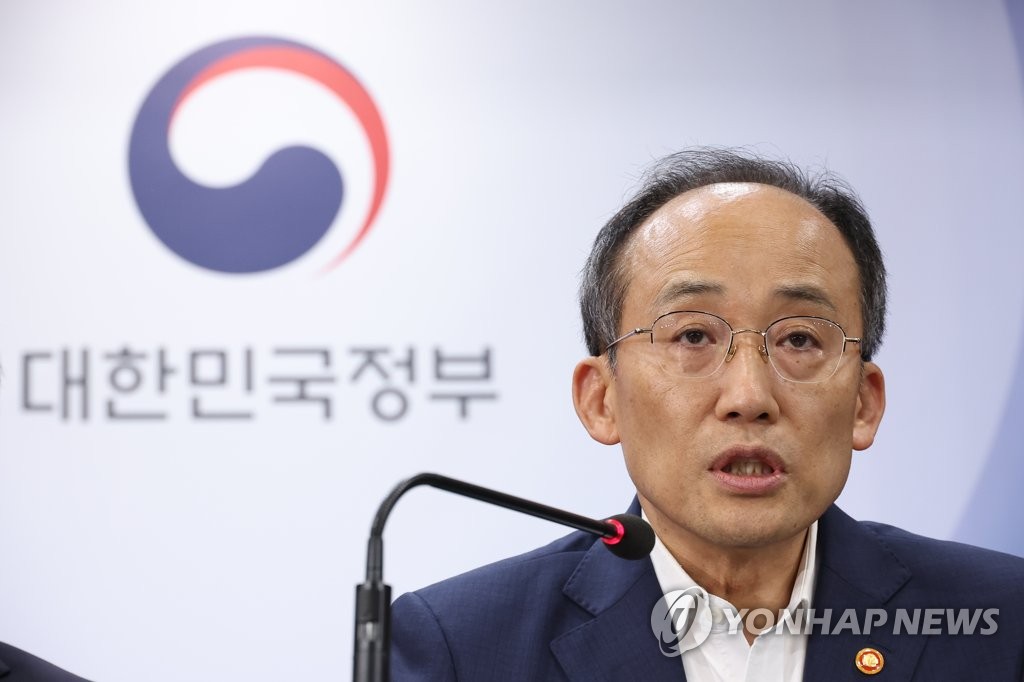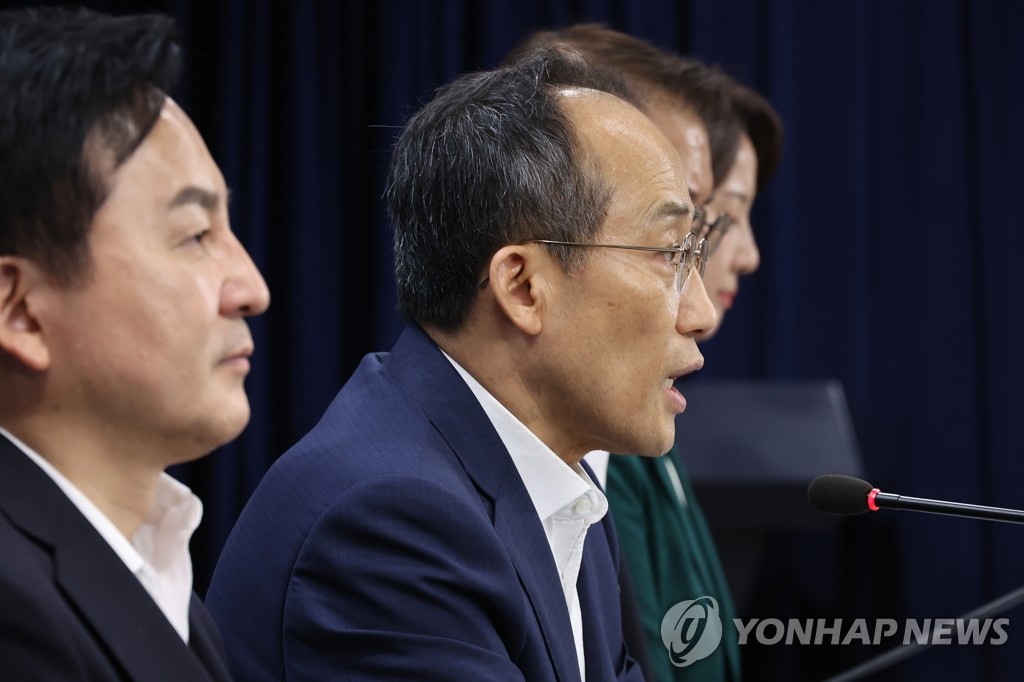 |
| ▲ Finance Minister Choo Kyung-ho speaks during a press briefing in Seoul on July 4, 2023. (Yonhap) |
 |
| ▲ Finance Minister Choo Kyung-ho (C) speaks during a press briefing in Seoul on July 4, 2023. (Yonhap) |
(LEAD) economic policy-H2 plan
(LEAD) S. Korea cuts 2023 economic growth outlook to 1.4 pct amid uncertainties
(ATTN: CHANGES photo; UPDATES with details in last 5 paras)
By Kang Yoon-seung
SEOUL, July 4 (Yonhap) -- South Korea slashed its growth forecast for this year to 1.4 percent due to the sluggish performance in the first half, the finance ministry said Tuesday, although the country is anticipated to enjoy better-than-expected employment and slower inflation.
The latest projection marks a 0.2 percentage point drop from the previous outlook of 1.6 percent growth suggested in December.
"This year, the economic growth will hover below the previous estimate due to the sluggish performance in the first half. However, the economy will gradually recover over the second half, and begin a full-fledged recovery next year," the Ministry of Economy and Finance said in its outlook report.
In detail, the government expected the South Korean economy to grow 1.8 percent on-year in the second half, eventually reaching 2.4 percent growth in 2024. In the January-June period, the economy edged up 0.9 percent.
The updated outlook comes in line with those projected by other organizations.
In May, the Bank of Korea lowered its growth outlook for South Korea to 1.4 percent from a 1.6 percent expansion predicted three months earlier. The state-run Korea Development Institute slashed its growth outlook by 0.3 percentage point to 1.5 percent.
"While the private consumption is expected to continue to grow gradually, the recovery in the chip sector is set to lend a hand to exports' rebound, eventually leading the growth in the second half," it added.
South Korea has been grappling with slowing exports, with its outbound shipments falling for nine consecutive months as of June.
Outbound shipments fell 6 percent on-year to US$54.24 billion last month, as exports of semiconductors, the country's key export item, sank 28 percent on falling demand and a drop in chip prices.
But June saw the smallest on-year export decline so far this year, possibly indicating that the country's exports may rebound in the July-December period of this year.
The finance ministry expected exports to decrease 6.6 percent on-year in 2023, with gains from automobiles and batteries offsetting losses from chips.
"Concerns over an economic slowdown in major countries including the United States and China, along with a possible delay in the recovery of the chip industry, are downward risks," it added.
The ministry projected the private consumption to rise 2.5 percent on-year in 2023 as people return to pre-pandemic normalcy.
The high borrowing costs, however, are anticipated to limit the growth, it added.
The central bank held the benchmark interest rate steady for the third straight time in May at 3.5 percent on easing inflationary pressure amid rising concerns over an economic slowdown. The bank delivered seven consecutive hikes in borrowing costs from April 2022 to January 2023.
The facility investment was projected to decrease by 1.2 percent on-year due mainly to the sluggish performance of the chip industry.
As for the job market, the finance ministry estimated the number of employed people to rise by 320,000 on-year each month, significantly up from the previous estimate of 100,000.
The revised outlook came as the number of jobs continued to increase in areas such as face-to-face services, health care, and welfare.
The employment-to-population ratio of South Koreans aged 15 and above reached 63.5 percent in May, up 0.5 percentage point on-year, marking the highest level for any May since the country began compiling related data in 1982.
The job market remained, however, challenging for younger South Koreans, as most of the positions were created for those aged 60 and above
South Korea also suggested slower-than-expected inflation of 3.3 percent for 2023, compared to the previous estimate of 3.5 percent.
The country's consumer price growth rose 2.7 percent last month from a year earlier, marking the first time for the figure to fall below 3 percent since September 2021.
"Consumer prices slowed faster than expected, following the stabilized global prices of raw materials such as energy sources and grains, along with robust output in the agricultural sector," the ministry said.
The ministry, however, said uncertainties nevertheless will linger amid geopolitical risks, such as the war between Russia and Ukraine.
"The South Korean economy, which has been facing more challenges than ever, is gradually recovering (since the launch of the Yoon Suk Yeol administration)," Finance Minister Choo Kyung-ho said.
The minister said it is notable that the government has been operating sound fiscal management, while normalizing the property market by lifting punitive tax policies and regulations.
In terms of exports, Choo added Asia's fourth-largest economy is expected to show more clear signs of recovery down the road.
"Nevertheless, there are still high uncertainties in different areas including the global economy and the financial market," Choo said.
"We need to stay vigilant amid the slowed growth in the U.S. and China, a possible delay in the IT industry, volatility in the global financial market, along with the lingering war between Russia and Ukraine," he added.
(END)
(C) Yonhap News Agency. All Rights Reserved























